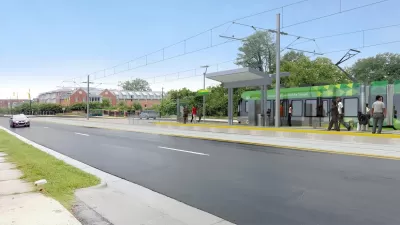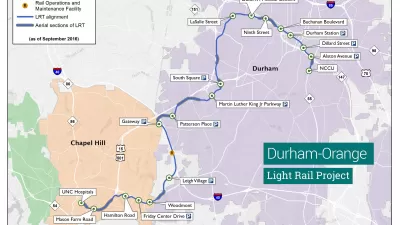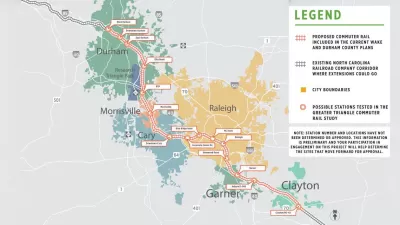Duke University will not sign an agreement for a regional rail project that has widespread support from the campus community.

On February 27, Duke University announced it would not sign a cooperative agreement for the Durham-Orange light rail project, a $3.3-billion, 17-mile rail line that would connect UNC-Chapel Hill, Duke, downtown Durham, and North Carolina Central University.
Ahead of the decision, 51 Duke faculty and staff signed onto a letter urging the university to support the project. The letter outlines the various benefits the rail line would bring to the region, including affordable housing, access to jobs and education, and improved air quality.
The university has raised a series of concerns about the rail project, but GoTriangle, the regional transit agency, says it has worked to address these issues. "For example, to quiet concerns Duke officials had about electric power connections with Duke Medical Center, GoTriangle added a $90-million elevated portion for the light rail," reports Angie Schmitt.
GoTriangle and Durham County officials are asking Duke to participate in a mediation process to address the university’s concerns.
FULL STORY: Duke Climate Scientist Criticizes the University’s Light Rail Obstructionism

Study: Maui’s Plan to Convert Vacation Rentals to Long-Term Housing Could Cause Nearly $1 Billion Economic Loss
The plan would reduce visitor accommodation by 25,% resulting in 1,900 jobs lost.

North Texas Transit Leaders Tout Benefits of TOD for Growing Region
At a summit focused on transit-oriented development, policymakers discussed how North Texas’ expanded light rail system can serve as a tool for economic growth.

Why Should We Subsidize Public Transportation?
Many public transit agencies face financial stress due to rising costs, declining fare revenue, and declining subsidies. Transit advocates must provide a strong business case for increasing public transit funding.

How to Make US Trains Faster
Changes to boarding platforms and a switch to electric trains could improve U.S. passenger rail service without the added cost of high-speed rail.

Columbia’s Revitalized ‘Loop’ Is a Hub for Local Entrepreneurs
A focus on small businesses is helping a commercial corridor in Columbia, Missouri thrive.

Invasive Insect Threatens Minnesota’s Ash Forests
The Emerald Ash Borer is a rapidly spreading invasive pest threatening Minnesota’s ash trees, and homeowners are encouraged to plant diverse replacement species, avoid moving ash firewood, and monitor for signs of infestation.
Urban Design for Planners 1: Software Tools
This six-course series explores essential urban design concepts using open source software and equips planners with the tools they need to participate fully in the urban design process.
Planning for Universal Design
Learn the tools for implementing Universal Design in planning regulations.
Ascent Environmental
Borough of Carlisle
Institute for Housing and Urban Development Studies (IHS)
City of Grandview
Harvard GSD Executive Education
Toledo-Lucas County Plan Commissions
Salt Lake City
NYU Wagner Graduate School of Public Service





























